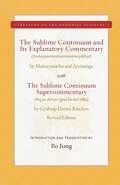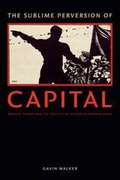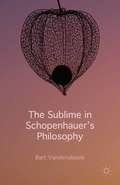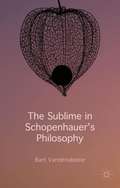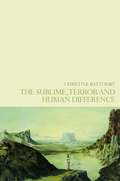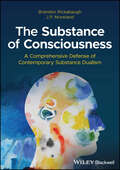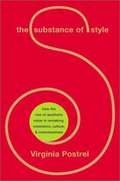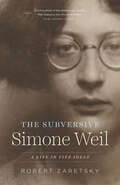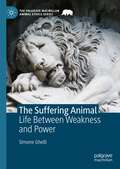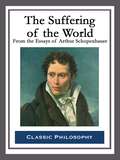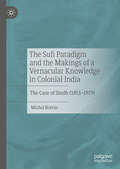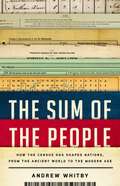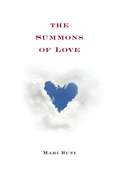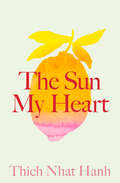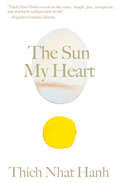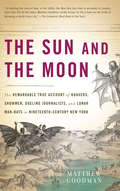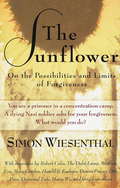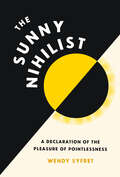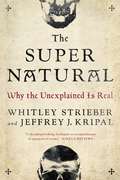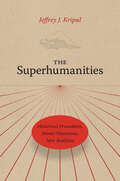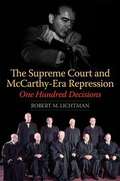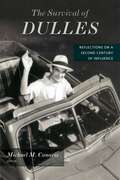- Table View
- List View
The Sublime Continuum and Its Explanatory Commentary: With the Sublime Continuum Supercommentary - Revised Edition (Treasury of the Buddhist Sciences)
by Bo JiangExplore an in-depth explanation of buddha nature and self-emptiness.The original Sublime Continuum Explanatory Commentary was written by Noble Asanga to explain the verses received from the bodhisattva Maitreya in the late fourth century CE in northern India. Here it is introduced and presented in an original translation from Sanskrit and Tibetan, with the translation of an extensive Tibetan Supercommentary by Gyaltsap Darma Rinchen (1364–1432), whose work closely followed the view of his teacher, Tsong Khapa (1357–1419). Contemporary scholars have widely misunderstood the Buddhist Centrist (Madhyamaka) teaching of emptiness, or selflessness, as either a form of nihilism or a radical skepticism. Yet Buddhist philosophers from Nagarjuna on have shown that the negation of intrinsic reality, when accurately understood, affirms the supreme value of relative realities. Gyaltsap Darma Rinchen, in his Supercommentary, elucidates a highly positive theory of the buddha nature, showing how the wisdom of emptiness empowers the compassionate life of the enlightened, as it is touched by its oneness with the truth body of all buddhas. With his clear study of Gyaltsap&’s insight and his original English translation, Bo Jiang completes his historic project of studying and presenting these works from Sanskrit and Tibetan in both Chinese and, now, English translations, in linked publications.
The Sublime Perversion of Capital: Marxist Theory and the Politics of History in Modern Japan
by Gavin WalkerIn The Sublime Perversion of Capital Gavin Walker examines the Japanese debate about capitalism between the 1920s and 1950s, using it as a "prehistory" to consider current discussions of uneven development and contemporary topics in Marxist theory and historiography. Walker locates the debate's culmination in the work of Uno Kozo, whose investigations into the development of capitalism and the commodification of labor power are essential for rethinking the national question in Marxist theory. Walker's analysis of Uno and the Japanese debate strips Marxist historiography of its Eurocentric focus, showing how Marxist thought was globalized from the start. In analyzing the little-heralded tradition of Japanese Marxist theory alongside Marx himself, Walker not only offers new insights into the transition to capitalism, the rise of globalization, and the relation between capital and the formation of the nation-state; he provides new ways to break Marxist theory's impasse with postcolonial studies and critical theory.
The Sublime Seneca
by Erik GundersonThis is an extended meditation on ethics in literature across the Senecan corpus. There are two chapters on the Moral Letters, asking how one is to read philosophy or how one can write about being. Moving from the Letters to the Natural Questions and Dialogues, Professor Gunderson explores how authorship works at the level both of the work and of the world, the ethics of seeing, and the question of how one can give up on the here and now and behold instead some other, better ethical sphere. Seneca's tragedies offer words of caution: desire might well subvert reason at its most profound level (Phaedra), or humanity's painful separation from the sublime might be part of some cruel divine plan (The Madness of Hercules). The book concludes by considering what, if anything, we are to make of Seneca's efforts to enlighten us.
The Sublime in Antiquity
by James I. PorterCurrent understandings of the sublime are focused by a single word ('sublimity') and by a single author ('Longinus'). The sublime is not a word: it is a concept and an experience, or rather a whole range of ideas, meanings and experiences that are embedded in conceptual and experiential patterns. Once we train our sights on these patterns a radically different prospect on the sublime in antiquity comes to light, one that touches everything from its range of expressions to its dates of emergence, evolution, role in the cultures of antiquity as a whole, and later reception. This book is the first to outline an alternative account of the sublime in Greek and Roman poetry, philosophy, and the sciences, in addition to rhetoric and literary criticism. It offers new readings of Longinus without privileging him, but instead situates him within a much larger context of reflection on the sublime in antiquity.
The Sublime in Modern Philosophy
by Emily BradyIn The Sublime in Modern Philosophy: Aesthetics, Ethics, and Nature, Emily Brady takes a fresh look at the sublime and shows why it endures as a meaningful concept in contemporary philosophy. In a reassessment of historical approaches, the first part of the book identifies the scope and value of the sublime in eighteenth-century philosophy (with a focus on Kant), nineteenth-century philosophy and Romanticism, and early wilderness aesthetics. The second part examines the sublime's contemporary significance through its relationship to the arts; its position with respect to other aesthetic categories involving mixed or negative emotions, such as tragedy; and its place in environmental aesthetics and ethics. Far from being an outmoded concept, Brady argues that the sublime is a distinctive aesthetic category which reveals an important, if sometimes challenging, aesthetic-moral relationship with the natural world.
The Sublime in Schopenhauer's Philosophy
by Bart VandenabeeleThe Sublime in Schopenhauer's Philosophy transforms our understanding of Schopenhauer's aesthetics and anthropology. Vandenabeele seeks ultimately to rework Schopenhauer's theory into a viable form so as to establish the sublime as a distinctive aesthetic category with a broader existential and metaphysical significance.
The Sublime in Schopenhauer’s Philosophy
by Bart VandenabeeleThe Sublime in Schopenhauer’s Philosophy.
The Sublime, Terror and Human Difference
by Christine BattersbyChristine Battersby is a leading thinker in the field of philosophy, gender studies and visual and literary aesthetics. In this important new work, she undertakes an exploration of the nature of the sublime, one of the most important topics in contemporary debates about modernity, politics and art. Through a compelling examination of terror, transcendence and the ‘other’ in key European philosophers and writers, Battersby articulates a radical ‘female sublime’. A central feature of The Sublime, Terror and Human Difference is its engagement with recent debates around ‘9/11’, race and Islam. Battersby shows how, since the eighteenth century, the pleasures of the sublime have been described in terms of the transcendence of terror. Linked to the ‘feminine’, the sublime was closed off to flesh-and-blood women, to ‘Orientals’ and to other supposedly ‘inferior’ human types. Engaging with Kant, Burke, the German Romantics, Nietzsche, Derrida, Lyotard, Irigaray and Arendt, as well as with women writers and artists, Battersby traces the history of these exclusions, while finding resources within the history of western culture for thinking human differences afresh The Sublime, Terror and Human Difference is essential reading for students of continental philosophy, gender studies, aesthetics, literary theory, visual culture, and race and social theory.
The Substance of Consciousness: A Comprehensive Defense of Contemporary Substance Dualism
by J. P. Moreland Brandon RickabaughA singularly powerful and rigorous argument in favor of modern substance dualism In The Substance of Consciousness: A Comprehensive Defense of Contemporary Substance Dualism, two distinguished philosophers deliver a unique and powerful defense of contemporary substance dualism, which makes the claim that the human person is an embodied fundamental, immaterial, and unifying substance. Multidisciplinary in scope, the book explores areas of philosophy, cognitive science, neuroscience, and the sociology of mind-body beliefs. The authors present the most comprehensive, up-to-date, and rigorous non-edited work on substance dualism in the field, as well as a detailed history of how property and substance dualism have been presented and evaluated over the last 150 years. Alongside developing new and updated positive arguments for substance dualism, they also discuss key metaphysical notions and distinctions that inform the examination of substance dualism and its alternatives. Readers will also find: A thorough examination of the recent shift away from standard physicalism and the renaissance of substance dualism Comprehensive explorations of the likely future of substance dualism in the twenty-first century, including an exhaustive list of proposed research projects for substance dualists Practical discussion of new and rigorous critiques of significant physicality alternatives, including emergentism and panpsychism. Extensive treatments of philosophy of mind debates about the roles played by staunch/faint-hearted naturalism and theism in establishing or presuming methodology, epistemic priorities, and prior metaphysical commitments Perfect for professional philosophers, The Substance of Consciousness will also earn a place in the libraries of consciousness researchers, philosophical theologians, and religious studies scholars.
The Substance of Style: How the Rise of Aesthetic Value Is Remaking Commerce, Culture, and Consciousness
by Virginia PostrelWith thorough scholarship, this highly acclaimed editor and journalist argues that aesthetic appreciation of the sleek and colorful surfaces of commercial goods and activities has value and legitimacy in spite of the disparagement of austere critics who demand that form follow function.
The Subversive Simone Weil: A Life in Five Ideas
by Robert ZaretskyThis exploration of the contradictary philosopher is “a beautifully sharp and thoughtful account of her life and work—a fascinating read” (Sarah Bakewell, New York Times–bestselling author).Known as the “patron saint of all outsiders,” Simone Weil (1909–43) was one of the twentieth century's most remarkable thinkers, a philosopher who truly lived by her political and ethical ideals. In a short life framed by the two world wars, Weil taught philosophy to lycée students and organized union workers, fought alongside anarchists during the Spanish Civil War and labored alongside workers on assembly lines, joined the Free French movement in London and died in despair because she was not sent to France to help the Resistance.Though Weil published little during her life, after her death, thanks largely to the efforts of Albert Camus, hundreds of pages of her manuscripts were published to critical and popular acclaim. While many seekers have been attracted to Weil's religious thought, Robert Zaretsky gives us a different Weil, exploring her insights into politics and ethics, and showing us a new side of Weil that balances her contradictions—the rigorous rationalist who also had her own brand of Catholic mysticism; the revolutionary with a soft spot for anarchism yet who believed in the hierarchy of labor; and the humanitarian who emphasized human needs and obligations over human rights. Reflecting on the relationship between thought and action in Weil's life, The Subversive Simone Weil honors the complexity of Weil's thought and speaks to why it matters and continues to fascinate readers today.
The Suffering Animal: Life Between Weakness and Power (The Palgrave Macmillan Animal Ethics Series)
by Simone GhelliThis book provides a critical and innovative reassessment of contemporary debate on the human-animal relationship. Starting with a critique of the “official philosophical narration” of animal studies, and then a reassessment of Descartes' animal-machine paradigm, Simone Ghelli tracks down the conceptual coordinates of what he calls “the paradigm of the suffering animal.” The suffering animal is a materialist thesis on the condition of the living, which, while contesting the metaphysical and anthropocentric structure of western axiology, eventually redefines and re-establishes ethics on the experience of suffering, that is on the mutual compassion sentient beings feel before the unjust sight of their finitude. The suffering animal paradigm shows how, within our philosophical tradition, the animal question has been always intertwined with the questions of atheism and of materialism. The ultimate aim of this research is to define the “ethical equilibrium” between aspects of the living, such as weakness and power, joy and suffering, life and death, which our philosophical tradition largely tends to consider as mutually excluding. To overcome such oppositions means avoiding opposing, in our ethical and political discourse, the defense of the vulnerability of the weak and the freedom of the powerful.
The Suffering of the World
by Arthur SchopenhauerArthur Schopenhauer was one of the world's most influential philosophers. Included here are nine of his most important essays, including 'On the Sufferings of the World,' 'The Vanity of Existence,' 'On Suicide,' 'Immortality: a Dialogue,' 'Psychological Observations,' 'On Education,' 'Of Women,' 'On Noise,' and
The Sufi Paradigm and the Makings of a Vernacular Knowledge in Colonial India: The Case of Sindh (1851–1929)
by Michel BoivinThis book demonstrates how a local elite built upon colonial knowledge to produce a vernacular knowledge that maintained the older legacy of a pluralistic Sufism. As the British reprinted a Sufi work, Shah Abd al-Latif Bhittai's Shah jo risalo, in an effort to teach British officers Sindhi, the local intelligentsia, particularly driven by a Hindu caste of professional scribes (the Amils), seized on the moment to promote a transformation from traditional and popular Sufism (the tasawuf) to a Sufi culture (Sufiyani saqafat). Using modern tools, such as the printing press, and borrowing European vocabulary and ideology, such as Theosophical Society, the intelligentsia used Sufism as an idiomatic matrix that functioned to incorporate difference and a multitude of devotional traditions—Sufi, non-Sufi, and non-Muslim—into a complex, metaphysical spirituality that transcended the nation-state and filled the intellectual, spiritual, and emotional voids of postmodernity.
The Sum of the People: How the Census Has Shaped Nations, from the Ancient World to the Modern Age
by Andrew WhitbyThis fascinating three-thousand-year history of the census traces the making of the modern survey and explores its political power in the age of big data and surveillance.In April 2020, the United States will embark on what has been called "the largest peacetime mobilization in American history": the decennial population census. It is part of a tradition of counting people that goes back at least three millennia and now spans the globe.In The Sum of the People, data scientist Andrew Whitby traces the remarkable history of the census, from ancient China and the Roman Empire, through revolutionary America and Nazi-occupied Europe, to the steps of the Supreme Court. Marvels of democracy, instruments of exclusion, and, at worst, tools of tyranny and genocide, censuses have always profoundly shaped the societies we've built. Today, as we struggle to resist the creep of mass surveillance, the traditional census -- direct and transparent -- may offer the seeds of an alternative.
The Summons of Love
by Mari RutiWe are conditioned to think that love heals wounds, makes us happy, and gives our lives meaning. When the opposite occurs and love causes fracturing, disenchantment, and existential turmoil, we suffer deeply, especially if we feel that love has failed us or that we have failed to experience what others seem so effortlessly to enjoy. In this eloquently argued, psychologically informed book, Mari Ruti portrays love as a much more complex, multifaceted phenomenon than we tend to appreciate—an experience that helps us encounter the depths of human existence. Love's ruptures are as important as its triumphs, and sometimes love succeeds because it fails. At the heart of Ruti's argument is a meditation on interpersonal ethics that acknowledges the inherent opacity of human interiority and the difficulty of taking responsibility for what we cannot fully understand. Yet the fact that humans are often irrational in love does not absolve us of ethical accountability. In Ruti's view, we must work harder to map the unconscious patterns motivating our romantic behavior. As opposed to popular spiritual approaches urging us to live fully in the now, Ruti treats the past as a living component of the present. Only when we catch ourselves at those moments when the past speaks in the present can we keep ourselves from hurting the ones we love. Equally important, Ruti emphasizes transcending our individual histories of pain, an act that allows us to face the unconscious demons that dictate our relational choices. Written with substance and compassion, The Summons of Love restores the enlivening and transformative possibilities of romance.
The Sun My Heart: The Companion to The Miracle of Mindfulness
by Thich Nhat HanhThis sequel to The Miracle of Mindfulness offers accessible, eye-opening guidance for spiritual seekers on the path from mindfulness to true insight The Sun My Heart is one of Thich Nhat Hanh&’s most beloved books. Using the objects and events of everyday life in his hermitage in Plum Village—the gradual settling of the pulp in a glass of apple juice or the wind blowing into the room and scattering papers about—Thich Nhat Hanh draws from Buddhist psychology, epistemology, and the world of contemporary literature and science to guide the reader along the path of clarity and understanding. This book can be read straight through, but is also designed to be opened randomly and experienced chapter by chapter, paragraph by paragraph. Thich Nhat Hanh suggests in the introduction that The Sun My Heart &“prefers to be a friend rather than a book. You can take it with you on the bus or subway as you do your coat or your scarf. It can give you small moments of joy at any time.&”
The Sun My Heart: The Companion to The Miracle of Mindfulness (Thich Nhat Hanh Classics)
by Thich Nhat HanhThe Sun My Heart is one of Thich Nhat Hanh’s most beloved books. It was written as a sequel to Miracle of Mindfulness and contains the journey, on the path of everyday practice, from mindfulness to insight in an informational, conversational manner. Using the objects and events of everyday life in his hermitage in Plum Village—the gradual settling of the pulp in a glass of apple juice or the wind blowing into the room and scattering papers about—Thich Nhat Hanh draws from Buddhist psychology, epistemology, and the world of contemporary literature and science to guide the reader along the path of clarity and understanding.This book can be read straight through, but is also designed to be opened randomly and experienced chapter by chapter, paragraph by paragraph. Thich Nhat Hanh suggests in the Introduction that The Sun My Heart "prefers to be a friend rather than a book. You can take it with you on the bus or subway as you do your coat or your scarf. It can give you small moments of joy at any time."
The Sun and the Moon: The Remarkable True Account of Hoaxers, Showmen, Dueling Journalists, and Lunar Man-Bats in Nineteen
by Matthew GoodmanOn August 26, 1835, a fledgling newspaper called the Sun brought to New York the first accounts of remarkable lunar discoveries. A series of six articles reported the existence of life on the moon--including unicorns, beavers that walked on their hind legs, and four-foot-tall flying man-bats. In a matter of weeks it was the most broadly circulated newspaper story of the era, and the Sun, a working-class upstart, became the most widely read paper in the world. An exhilarating narrative history of a divided city on the cusp of greatness, and tale of a crew of writers, editors, and charlatans who stumbled on a new kind of journalism, The Sun and the Moon tells the surprisingly true story of the penny papers that made America a nation of newspaper readers.
The Sunflower: On the Possibilities and Limits of Forgiveness
by Simon WiesenthalWhile imprisoned in a Nazi concentration camp, Simon Wiesenthal was taken one day from his work detail to the bedside of a dying member of the SS. Haunted by the crimes in which he had participated, the soldier wanted to confess to--and obtain absolution from--a Jew. Faced with the choice between compassion and justice, silence and truth, Wiesenthal said nothing. But even years after the way had ended, he wondered: Had he done the right thing? What would you have done in his place?In this important book, fifty-three distinguished men and women respond to Wiesenthal's questions. They are theologians, political leaders, writers, jurists, psychiatrists, human rights activists, Holocaust survivors, and victims of attempted genocides in Bosnia, Cambodia, China and Tibet. Their responses, as varied as their experiences of the world, remind us that Wiesenthal's questions are not limited to events of the past. Often surprising and always thought provoking, The Sunflower will challenge you to define your beliefs about justice, compassion, and human responsibility.From the Trade Paperback edition.
The Sunny Nihilist: A Declaration of the Pleasure of Pointlessness
by Wendy SyfretA positively rebellious take on a traditionally negative philosophy offers an antidote for our anxious times.Career success, a beautiful life, a beautiful Instagram account—what's the point? In a world where meaning has become twisted into a form of currency that everyone is very keen to cash in on, journalist Wendy Syfret invites you to change the way you think about the way you think.In her seminal work, The Sunny Nihilist, Syfret presents the optimism in Nihilism, encouraging us to dismantle our self-care and self-centered way of living and accept a life more or less ordinary. Syfret re-examines the meaning of worth, value, time, happiness, success, and connection, and guides us towards the alternative path of pointless pleasure.When you let go of the idea that everything must have purpose, you will find relief from stress, exhaustion, and anxiety. Most importantly, you can embrace the opportunity to enjoy the moment, the present, the chaos and luck of being alive at all. The Sunny Nihilist is an inspiring call to action and survival adaptation for modern life.
The Super Natural
by Whitley Strieber Jeffrey J. KripalTwo of today's maverick authors on anomalous experience present a perception-altering and intellectually thrilling analysis of why the paranormal is real. Whitley Strieber (Communion) and Jeffrey J. Kripal (J. Newton Rayzor professor of religion at Rice University) team up on this unprecedented and intellectually vibrant new framing of inexplicable events and experiences. Rather than merely document the anomalous, these authors--one the man who popularized alien abduction and the other a renowned scholar and "renegade advocate for including the paranormal in religious studies" (The New York Times)--deliver a fast-paced and exhilarating study of why the supernatural is neither fantasy nor fiction but a vital and authentic aspect of life.Their suggestion? That all kinds of "impossible" things, from extra-dimensional beings to bilocation to bumps in the night, are not impossible at all: rather, they are a part of our natural world. But this natural world is immeasurably more weird, more wonderful, and probably more populated than we have so far imagined with our current categories and cultures, which are what really make these things seem "impossible." The Super Natural considers that the natural world is actually a "super natural world"--and all we have to do to see this is to change the lenses through which we are looking at it and the languages through which we are presently limiting it. In short: The extraordinary exists if we know how to look at and think about it.From the Hardcover edition.
The Superhumanities: Historical Precedents, Moral Objections, New Realities
by Jeffrey J. KripalA bold challenge to rethink the humanities as intimately connected to the superhuman and to “decolonize” reality itself.“One of the foremost historians of religion and a consummate storyteller, Kripal makes a compelling case for restoring the anomalous and inexplicable to the heart of inquiry in the humanities. A must-read for anyone interested in the future of education, society, and indeed reality and for all who have experienced or would like to experience amazement.” —Priscilla Wald, author of Contagious: Cultures, Carriers, and the Outbreak NarrativeWhat would happen if we reimagined the humanities as the superhumanities? If we acknowledged and celebrated the undercurrent of the fantastic within our humanistic disciplines, entirely new cultural worlds and meanings would become possible. That is Jeffrey J. Kripal’s vision for the future—to revive the suppressed dimension of the superhumanities, which consists of rare but real altered states of knowledge that have driven the creative processes of many of our most revered authors, artists, and activists. In Kripal’s telling, the history of the humanities is filled with precognitive dreams, evolving superhumans, and doubled selves. The basic idea of the superhuman, for Kripal, is at the core of who and what the human species has tried to become over millennia and around the planet.After diagnosing the basic malaise of the humanities—that the truth must be depressing—Kripal shows how it can all be done differently. He argues that we have to decolonize reality itself if we are going to take human diversity seriously. Toward this pluralist end, he engages psychoanalytic, Black critical, feminist, postcolonial, queer, and ecocritical theory. He works through objections to the superhumanities while also recognizing the new realities represented by the contemporary sciences. In doing so, he tries to move beyond naysaying practices of critique toward a future that can embrace those critiques within a more holistic view—a view that recognizes the human being as both a social-political animal as well as an evolved cosmic species that understands and experiences itself as something super.“An electrifying, glorious, loving, and almost deranged romp through humanity’s greatest recurrent ideas and experiences, The Superhumanities is for anyone who senses that the transformative power of books, ideas, and spiritual experiences are intertwined and too often estranged.” —Jonathan Haidt, author of The Righteous Mind: Why Good People Are Divided by Politics and Religion
The Supreme Court and McCarthy-Era Repression: One Hundred Decisions
by Robert M. LichtmanThe 1950s "Red Scare" marks one of the stormiest periods in U.S. Supreme Court history. Robert M. Lichtman provides the definitive history of the high court's decisions in every one of the "Communist" cases it decided, placing each within the context of the time and revealing the broad range and impact of McCarthy-era repression. Making extensive use of the justices' papers, Lichtman examines the dynamics of the Court's changes in direction, from the Vinson Court's rubber-stamping of government action against subversives to the Warren Court's more liberal rulings and the subsequent retreat led by Felix Frankfurter. Lichtman's account details the Court's surprising vulnerability to popular and political attack and reveals the behind-the-scenes relationships and rivalries among justices. At the same time, he recounts in devastating detail the injuries inflicted by McCarthyism on individuals and the nation.
The Survival of Dulles: Reflections on a Second Century of Influence
by Michael M. CanarisThis collection, marking the centenary of Avery Dulles’s birth, makes an entirely distinctive contribution to contemporary theological discourse as we approach the second century of the cardinal’s influence, and the twenty-first of Christian witness in the world. Moving beyond a festschrift, the volume offers both historical analyses of Dulles’s contributions and applications of his insights and methodologies to current issues like immigration, exclusion, and digital culture. It includes essays by Dulles’s students, colleagues, and peers, as well as by emerging scholars who have been and continue to be indebted to his theological vision and encyclopedic fluency in the ecclesiological developments of the post-conciliar Church. Though focused more on Catholic and ecumenical affairs than interreligious ones, the volume is intentionally outward-facing and strives to make clear the diverse and pluralistic contours of the cardinal’s nearly unrivaled impact on the North American Church, which truly crossed ideological, denominational, and generational boundaries. While critically recognizing the limits and lacunae of his historical moment, it serves as one among a multitude of testaments to the notion that the ripples of Avery Dulles’s influence continue to widen toward intellectually distant shores.
